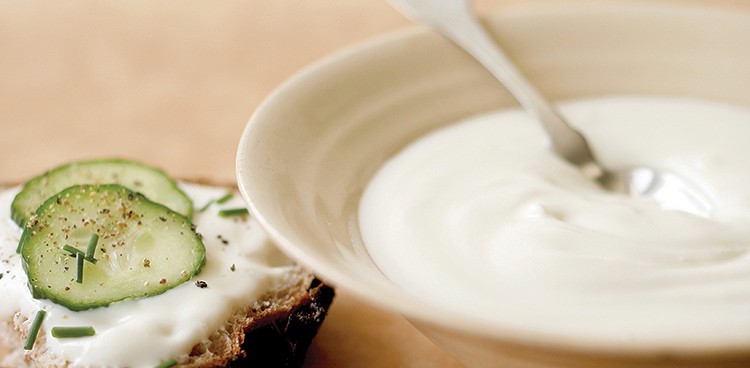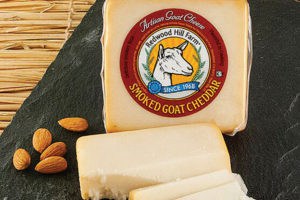
Jewish Culture is featured in our Spring 2017 issue.
Kosher cheese has never really been on my radar. Indeed, the stipulation that meat and dairy should not be eaten together in observant homes—sorry, cheeseburgers!—was once the extent of my kosher dairy knowledge. As a non-kosher-keeping Jew, I haven’t followed the doctrine. Until recently, that is.
Before our wedding last summer, my husband and I arranged to sponsor a kiddush luncheon—served after Saturday morning Shabbat service—at our synagogue in honor of our upcoming nuptials. Eschewing a caterer, I thought myself more than capable of pulling together a simple meal of breads, crackers, fruits, vegetables, and cheeses for 40 guests. Because many members of our community follow a strict kosher diet, the synagogue requires that any packaged foods brought in bear a hechsher (pronounced “heck-shur”).
The mark can take many forms—a capital “U” or “K” outlined by a circle, the letters “KSA,” to name a few—and certifies that the item has been prepared and packaged under rabbinic supervision according to Jewish law. (Contrary to popular belief, it does not mean that the food is blessed by a rabbi.) When it comes to cheese, there’s a second stipulation: Rennet used to curdle the milk must come from the stomach of a kosher animal (such as a cow). I was surprised to learn that animal rennet plus milk is a kosher-acceptable combination, but Rabbi David Kasher, senior rabbinic educator at nonprofit Kevah in Berkeley, Calif., points to a ruling made long ago: The amount of rennet used to turn milk into cheese is considered so miniscule that it does not count. (Alternately, kosher cheese may be produced with vegetarian rennet.)
Armed with my newfound knowledge, I set off to procure a tasty assortment of cheeses made under rabbinic supervision from milk curdled using kosher rennet. Instead I discovered that only a few wheels and wedges sold at Trader Joe’s—my favorite place to purchase quality cheese at affordable prices—fit into this category.
There were a couple of fresh offerings such as chèvre, made without animal rennet, and a single decent-looking raw cheddar, but certainly not enough for a bountiful spread. I hit the same wall at Whole Foods. Eventually, I headed to the sole specialty kosher grocer within 20 miles of my San Francisco home, and found the selection extremely underwhelming compared to artisanal cheeses I’m accustomed to buying. Great kosher cheese, it turns out, is hard to come by.

Redwood Hill Farm’s smoked goat cheddar
The humdrum cheeses on the market are “often made in large factory settings from milk without a distinct source, so they are lacking any sense of terroir,” says Zach Berg, a cheesemonger who has worked at Zingerman’s Delicatessen in Ann Arbor, Mich., and Bi-Rite Market in San Francisco. However, this is starting to change. “A handful of well-respected cheesemakers and dairies are pursuing hechshers but don’t necessarily market themselves as [making] kosher cheese,” he says. Redwood Hill Farm & Creamery in Sebastopol, Calif., makes kosher cheeses, for example, and some of Vermont Creamery’s fresh cheeses are certified as well. “Still, I think that there is room for more kosher cheesemakers to make outstanding cheeses,” Berg adds.
Allison Hooper, co-founder of Vermont Creamery, sought kosher certification for the company’s cow’s milk products “at the request of many customers who keep kosher for religious reasons,” she says. “We want to meet as many of our customers’ lifestyle and dietary restrictions as we realistically can. We also hear that kosher certification is more broadly seen to be a mark of quality.” For Redwood Hill Farm’s Jennifer Lynn Bice, the decision was personal. Her late husband, Steven Schack, was Jewish—and it was important to him that they create hechsher-marked dairy products. Perfecting the recipe, however, required years of trial and error: “It takes a lot of skill to get the flavor and texture of kosher cheese right,” Bice says. “We use vegetarian, microbial rennet, which can be challenging to work with because it can cause bitterness in aged, hard cheeses.”
In recent years, kosher consumers have demanded meat that’s higher in quality than the factory-produced options available in grocery stores, leading to new purveyors of sustainably raised kosher meats such as Grow and Behold Foods and KOL Foods. With any luck, the kosher cheese industry will follow suit, taking inspiration from Hooper, Bice, and a handful of others.
So while a luscious triple cream would have complemented the fresh challah we served at our kiddush lunch beautifully, the bloomy goat’s milk Bucheret from Redwood Hill Farm was an arresting substitute.
Feature Photo Credit: Becky Luigart-Stayner Sunny House Studio courtesy of Vermont Creamery (Quark cheese shown)



